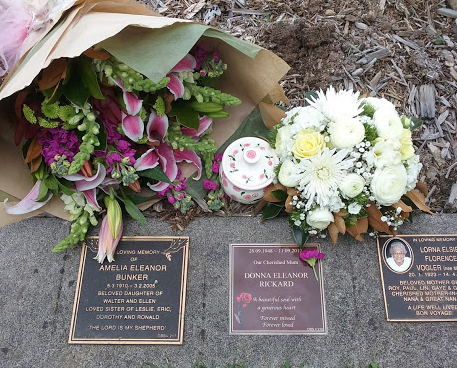My mum-in-law, Donna, never finished her puzzle. She loved the 9-letter puzzles from the Herald Sun. You can find them just past the “news” section (and yeah, those quotation marks are there on purpose). The puzzle maker gives you 8 letters around a central 9th letter. Your job is to form as many words as possible from any combination of the letters and, if you can, to find the 9-letter word that, together, they make up. Donna missed a few words like ‘repair’ and ‘rapier’, which I thought strange for a person of her formidable ability. I finished what I could, but I never did discover that 9-letter word.

My mum-in-law was young for an older person and her passing came as great shock. Someone so beautiful and generous deserved many more years in this world, and this world deserved many more years of her. We laid her to rest last week, inside one of her handbags (I know just what you’re thinking, but she was cremated first). God, she loved her handbags! It was a fitting send-off. To say that she’ll be missed is far too trite a phrase to describe the sense of loss we all feel.
What Dreams May Come
When we’re young, we believe ourselves invincible. But with age, we seem to become more and more vincible. We grow more susceptible to injury and recovery takes longer. The person in the mirror looks more weathered as the years pass. We come to recognise that we are, indeed, mortal. And the spectre of that mortality looms larger when loved ones of the generation before ours pass away.
We don’t like talking about death. We don’t even like thinking about death. “When I die…” is a surefire way to kill the mood in a room and you won’t be invited to social events if that’s your go-to conversation starter. I think, if we’re honest, the prospect of death scares many of us. We wonder what it might feel like. We want to know it won’t hurt and we hope that it will be quick. We wonder what happens after we depart this life.
I suppose, then, that the fear of death is essentially the fear of the unknown. As Shakespeare’s Hamlet stated, death is a journey to ‘the undiscovered country from whose bourn no traveller returns’. We don’t get postcards or selfies from the other side. We can’t ask, “How was your trip?” or “Was the flight bumpy?” or “What are things like there?” Simply put, no one survives the experience to report back to us.
The One Who Came Back
But what if someone did? In fact, that’s the beating heart of Christian belief: that One did pass through death and out again, alive and well. It’s on this truth that generations of Christians, from the 1st century to the 21st century, have pinned their hopes.
Interestingly, after showing back up unexpectedly, Jesus seemingly had next to nothing to say about dying, what it was like or what greeted him after his last breath on the cross. He didn’t hand out copies of What to Expect When You’re Expecting to Die. And the New Testament writers don’t seem particularly interested in the particulars – only the astounding reality of the Messiah’s resurrection, his return in flesh and blood, and the new world which had dawned as a result. That’s the funny thing about those authors and about Jesus himself: they’re far more interested in life – abundant life now and the life of the age to come – than they are about death.
About the only thing Jesus did say was that he would constantly remain with us ‘even to the end of the age’ (Matthew 28:20). It’s far deeper and more unfathomable than a hackneyed utterance meant to soothe small children and nice old ladies. It’s a promise that, when our ‘time’ comes, someone will abide with us in a tangible way, one who knows what passes through the mind as death approaches, one who understands what it feels like to die, one who knows what mysteries lie beyond, and most importantly, one who has defeated death itself by exhausting its power and rising once more to life.
That’s what I imagine when I think of my mum-in-law, sitting in bed, reading her book. I see Jesus tapping her on the shoulder, quietly whispering, ‘Sweetheart, it’s time,’ and then escorting her peacefully, arm in arm, from the room.
We’ll miss you, Donz. And sorry about that 9-letter word. I worked and worked at it, but honestly, it was a real bitch.


Leave a Reply